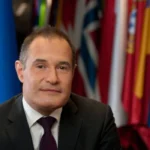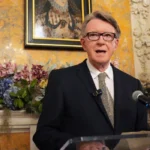In a recent public statement, the Prime Minister affirmed the government’s unwavering commitment to combating corruption in all its forms, setting an ambitious target to rank among the top three European countries with the lowest levels of corruption. This pledge marks a significant declaration of intent to deepen reforms and strengthen governance frameworks amid ongoing concerns about integrity and transparency in the public sector.
The Prime Minister explicitly underscored that fighting corruption is central to the government’s agenda, emphasizing the broad and serious impacts corruption has on society, economic development, and trust in institutions.
“We fight corruption in all its forms; aim to rank among Europe’s top three countries for low corruption,”
the Prime Minister stated, reinforcing a vision of clean governance as a cornerstone of national prosperity and democracy.
Context of Corruption Perception in Europe
Corruption remains an acute challenge across many European countries, as documented by the annual Corruption Perceptions Index (CPI) compiled by Transparency International. The 2024 edition of the CPI highlighted troubling trends, indicating that corruption had worsened or stagnated in numerous EU member states, with legal loopholes, weak enforcement, politicization of anti-corruption bodies, and shrinking rule of law cited as key factors.
Hungary and Slovakia were singled out in the latest index for systemic corruption and regression in governance standards, while Western Europe’s regional average score dipped slightly, signaling challenges even among comparatively cleaner countries. Meanwhile, Denmark, Finland, and Switzerland consistently ranked as Europe’s least corrupt nations, setting the benchmarks many aspire to meet.
The Prime Minister’s ambition to be among the top three low-corruption countries in Europe positions the government to compete with these leaders in transparency, accountability, and institutional integrity.
Accelerating Reforms and Institutional Strengthening
To realize this vision, the government has outlined an array of strategic measures aimed at tightening anti-corruption safeguards. These include enhancing the independence and powers of national anti-corruption agencies, increasing transparency requirements in public procurement and political financing, and toughening legal consequences for corruption offenses.
The Prime Minister highlighted that corruption undermines the rule of law and public trust, declaring,
“Corruption corrodes democracy, distorts markets, and wastes resources. Our mission is to restore faith in government by eradicating corrupt practices at every level.”
This mission is seen as crucial not only for complying with EU standards but for attracting investment, improving public services, and fostering social cohesion.
Significant investments in technology and digital governance are also part of the blueprint. Digital tools aimed at enhancing transparency, such as open data platforms and real-time monitoring of government projects, are being accelerated to raise accountability standards and reduce opportunities for corrupt practices.
Tackling Corruption Across Public Sectors
The government is taking a comprehensive approach, targeting corruption risks throughout the public sector. Public procurement, identified as a high-risk area globally, is being overhauled with stricter controls, enhanced audits, and mandatory disclosure of beneficiary ownership. This approach aims to dismantle the opaque networks that often facilitate bribery and favoritism.
Political party financing regulations are under review, with new rules proposed to prevent undue influence by special interests and ensure transparency in campaign funding. The Prime Minister stressed the importance of clean politics as a foundation for good governance, remarking,
“No democracy can flourish if its political system is tainted by corrupt influences.”
Law enforcement agencies and judiciary independence are key pillars in the government’s plan. Efforts to insulate anti-corruption investigations from political interference are underway, aiming to bolster public confidence in fair and impartial legal processes. The Prime Minister emphasized,
“Only through an independent judiciary can we guarantee justice and send a clear message that corruption will not be tolerated.”
Challenges and Public Sentiment
Despite these ambitions, tackling corruption is widely recognized as a complex and ongoing challenge. Corruption in many countries is deeply entrenched in political and economic systems, demanding persistent efforts, broad societal engagement, and continuous vigilance.
Recent public opinion surveys reveal widespread concern among citizens about corruption and suspicion of political elites. The government acknowledges these anxieties and is working to rebuild trust by improving transparency and citizen participation in governance.
The Prime Minister called on all sectors of society to join the fight against corruption, urging private businesses, civil society organizations, and ordinary citizens to collaborate in demanding accountability and upholding ethical standards in public life.
Regional and International Implications
The government’s anti-corruption initiative comes at a time when corruption is linked to broader challenges facing Europe, including governance crises, weakening rule of law, and undermined democratic norms. Transparency International’s report for 2024 warned that corruption exacerbates social inequalities and hampers the EU’s capacity to effectively address critical issues such as climate change and economic recovery.
The country’s bid to be among Europe’s cleanest governance models bolsters its standing within the EU and on the global stage, signaling commitment to shared European values of justice and transparency.
The Prime Minister concluded,
“Our ambition is not just symbolic — it is a practical commitment to building a fairer, more resilient society. Europe deserves strong examples of integrity, and we intend to deliver.”







